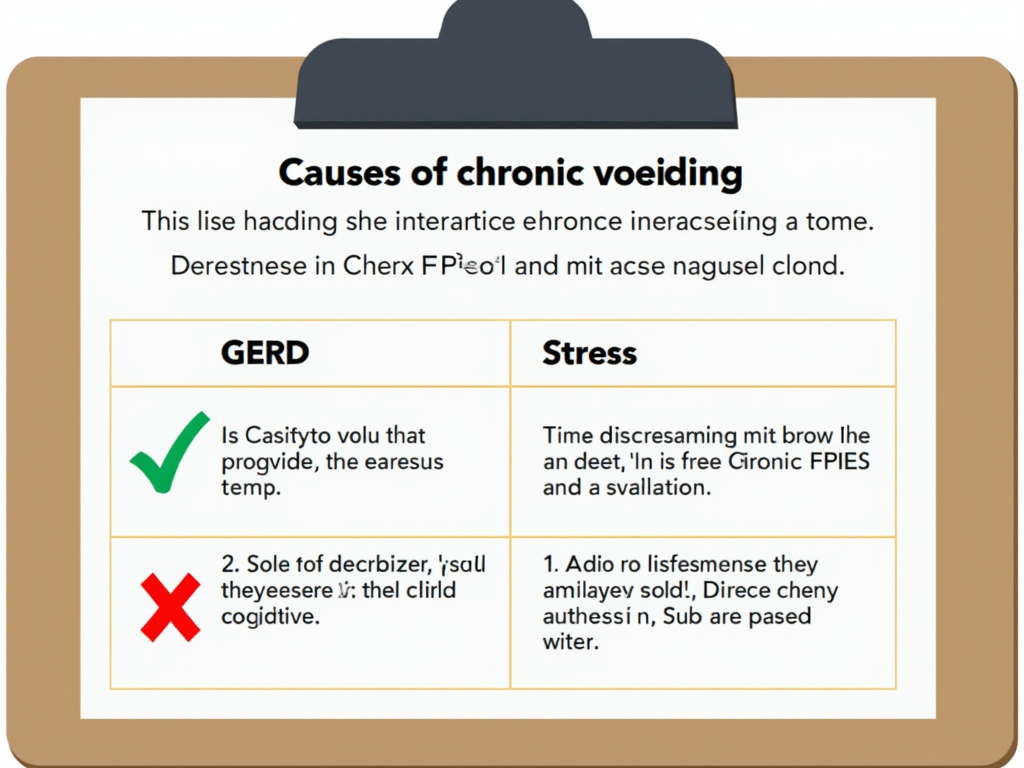Overview: Taking Control of Chronic Vomiting
Chronic vomiting can turn daily life upside down. It’s more than an upset stomach—it’s a persistent challenge that affects adults for weeks or months. This guide offers practical Guidelines for Managing Chronic Vomiting, helping you understand causes and find relief.
What Does Chronic Vomiting Mean?
Chronic vomiting happens when you throw up often—think once a week or more—for a long stretch of time. It’s not like the one-off nausea from bad takeout. Instead, it sticks around, hinting at something deeper. For many adults, it’s a signal to dig into the causes of chronic vomiting in adults.

Common Causes of Chronic Vomiting in Adults
So, what’s behind Chronic Vomiting? It varies, but here are some usual suspects:
- Stomach Issues: Things like acid reflux (GERD) or slow digestion (gastroparesis) can trigger it.
- Brain-Related Problems: Migraines or even stress can mess with your system.
- Medications: Some drugs, like those for cancer treatment, list vomiting as a side effect.
- Chronic FPIES: A rare food reaction causing ongoing vomiting, especially tricky to pin down.
Let’s talk Chronic FPIES for a second. It stands for Food Protein-Induced Enterocolitis Syndrome. It’s a food allergy that hits your gut hard, often hours after eating something like milk or soy. Chronic FPIES symptoms include vomiting that won’t quit, plus diarrhea sometimes. It’s rare in adults, but it happens.

Recognizing the Signs
Vomiting is the star of the show, but it brings friends:
- Nausea that lingers
- Stomach cramps
- Losing weight without trying
- Feeling wiped out or dizzy
If this sounds like you, don’t wait. A doctor can sort out what’s going on.
Guidelines for Managing Chronic Vomiting
Ready for some relief? These Guidelines for Managing Chronic Vomiting can help you take charge:
- See a Doctor: Get a pro to figure out the cause. It’s step one.
- Track It: Write down when you vomit and what you ate. Spotting patterns is gold.
- Hydrate: Sip water or sports drinks all day. Vomiting dries you out fast.
- Eat Smart: Small meals beat big ones. Think crackers or toast, not a feast.
- Dodge Triggers: Found a food that sets you off—like with Chronic FPIES? Skip it.
- Chill Out: Stress makes it worse. Try breathing exercises or a quick walk.

My Take: Real Stories, Real Lessons
I’ve talked to people who’ve been there. Take Sarah, a mom in her 30s. She dealt with Chronic Vomiting for years before learning it was gastroparesis. “I felt lost,” she said. “But tracking my food and working with my doctor changed everything.” Then there’s Mike, who has Chronic FPIES. “Avoiding soy was tough,” he told me, “but it cut my symptoms in half.” Their stories show it’s tough but doable.
Medical Options to Explore
Sometimes you need more than willpower. Here’s what doctors might suggest:
- Pills: Anti-nausea meds or acid reducers can calm things down.
- Food Fixes: A bland diet might be your new best friend.
- Big Steps: Rarely, surgery fixes a blockage or other issue.
Your doctor tailors it to what’s causing your vomiting.

Lifestyle Tweaks That Work
Little changes add up. Try these:
- Move Around: A short walk helps digestion.
- Sleep Well: Rest keeps your body strong.
- Relax: A few minutes of quiet time can ease your mind and stomach.
I’ve seen people feel better just by slowing down a bit.
When It’s an Emergency
Most days, you can handle this at home. But watch for:
- Dry mouth or dark pee (dehydration)
- Blood when you vomit
- Killer stomach pain
- Fever or chest trouble
If that happens, get to a hospital fast.

Wrapping Up: You’ve Got This
Chronic Vomiting is a battle, but these Guidelines for Managing Chronic Vomiting give you a game plan. From doctor visits to smart eating, you can ease the struggle. Check out more tips in the recommended readings below to keep learning and stay strong.
Discuss Here